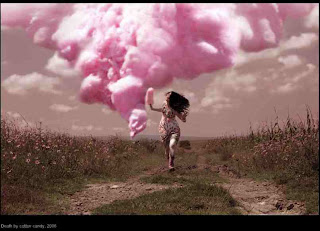1) Cacao is a tree, native to South America, whose seeds are the source of cocoa and chocolate.
2) Botanists believe that cacao trees grew wild in the Amazon region , however, the use of the cacao tree, for culinary purposes, did not begin until it reached the lush tropical lowlands of southern Mexico over 3000 years ago.
3) The oldest known civilization of the Americas (1500 - 400 B.C.), The Olmecs, were probably the first users of cacao.
Though few records survived, recent linguistic findings suggest the word "cacao" is derived from the word Kakawa in Mixe-Zoquean, believed to have been their language.
4) Cacao beans were so valuable in ancient Mexico that the Maya and subsequent Aztec and Toltec civilizations used them as a means of currency to pay for commodities and taxes.
The Aztecs, and other ancient indigenous cultures, believed chocolate to be an aphrodisiac. Although this is not exactly true, chocolate does contain phenyl ethylamine (PEA) which creates a chemical reaction in the brain similar to that of falling in love.
5) In the 17th Century, the first recorded case of “Death by Chocolate” occurred.
In San Cristobal de las Casa, in Chiapas, Mexico, upper class Spaniards were so addicted to chocolate intake that they refused a church dictated ban forbidding consumption of drink or food during Mass.
In response, the townspeople refused to uphold this edict and chose to attend worship services in Convents.
The Bishop of Chiapas, who passed the edict, was found dead due to a mixture of poison that was secretly added to his daily cup of chocolate. Rumor has it that he passed from this world with a smile on his face.
6) Cocoa, a rare and expensive commodity, had been introduced in Central Europe via Spain as early as the 1600’s but it wasn’t until 1765 that the first chocolate factory was established in the United States.
Chocolate was such as a prestigious luxury that the French Ruler, Louis XIV, also known as the “Sun King”, established a court position entitled Royal Chocolate Maker to the King.
7) The French Leader Napoleon insisted that wine, from the Burgundy vineyard called Chambertin, as well as chocolate be available during military campaigns.
Due to its precious nature, the distribution of chocolate was limited to himself and his senior military advisers.
8) In 1765, the company, Walter Baker Chocolate, was founded by Dr. James Baker and his chocolate maker John Hannon, in a converted wooden mill on the banks of the Neponset River in Massachusetts and thus the term “Baking Chocolate” came into being.
9) In 1828, cocoa in a powdered format became widely available. This allowed chocolate to become mass produced and widely available during Industrial Revolution of the nineteenth (19th) century.
10) In 1849 during the “Gold Rush” of San Francisco, Dominbro Ghirardelli of Italy began making chocolate. His original factory still stands at Ghirardelli Square in San Francisco, CA.
11) In 1868, a Parisian named Etienne Guittard arrived in California and started the Guittard Chocolate Company which is still in operation.
12) 1871 was a landmark year for American Chocolate as Milton Hershey, at the age of nineteen (19), founded his company in Pennsylvania.
13) In 1875, Milk Chocolate was introduced. After over eight (8) years of experimentation, Daniel Peter of Switzerland created this concoction.
He sold his creation to his neighbor, Henri Nestle, and thus Nestle Chocolate came into being.
14) In 1879, Rodolphe Lindt, the founder of Lindt Chocolates, invented the process of “Conching” which is used to refine chocolate thus enhancing it’s quality.
15) In 1896, the recipe for chocolate brownies, an American snack food staple, was introduced in the Fannie Farmer Cookbook.
16) In 1907, the iconic Milk Chocolate Hershey's Kisses were introduced. They are one of the most successful chocolates and Hershey produces approximately 20-25 million per day in a variety of flavors.
17) In 1913, a process was invented by a Swiss Confectioner named Jules Sechaud that allowed chocolates to have unique fillings.
18) The original 3 Musketeers Bar of the 1930s had three parts: chocolate, vanilla and strawberry.
It became all chocolate in the 1940s and the formula remains the same to this very day.
19) In 1938, Nestle Crunch was introduced. It was the first chocolate bar to combine milk chocolate and crunchy crisps to create a sensory eating experience that blended taste, texture and sound.
20) In 1939, Nestle introduced Chocolate Chips.
So successful was this collaboration, Hershey Chocolate was called upon during the Persian Gulf War to create a chocolate bar that could withstand high temperatures.
The “Desert Bars” were included in the soldier’s daily rations and were also sold to consumers for use in survival kits.
22) In 1960, Chocolate syrup was used to simulate blood in the famous shower scene in Alfred Hitchcock’s movie, “Psycho”. The scene, featuring Janet Leigh, took over seven days to shoot.
The U.S. produces more chocolate than any other country but the Swiss consume the most, followed closely by the English.
Americans eat an average of twenty two pounds of candy each year, or approximately 2.8 BILLION pounds annually, split almost equally between candy and chocolate. That is far less than most Europeans consume.
The Midwest and the Northeast consume more candy per region than the South, Southwest, West or Mid-Atlantic states.
The American palette prefers milk chocolate, approximately ninety two percent, but dark chocolate's popularity is growing rapidly.
American chocolate manufacturers use about 1.5 billion pounds of milk only surpassed by the cheese and ice cream industries. They also consume approximately 3,500,000 pounds of whole milk.
Chocolate manufacturers currently use forty 40% of the world's almonds and twenty 20 % of the world's peanuts.
As of 2006, consumers spent more than $7,000,000 a year on chocolate related products





Comments
Post a Comment